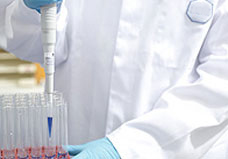| |
 |
|
|
|
|
|
|
Lung cancer |
|
|
What is lung cancer?
Cancer is a class of diseases characterized by out-of-control cell
growth, and lung cancer occurs when this uncontrolled cell growth
begins in one or both lungs. Rather than developing into healthy,
normal lung tissue, these abnormal cells continue dividing and
form lumps or masses of tissue called tumors. Tumors interfere
with the main function of the lung, which is to provide the
bloodstream with oxygen to be carried to the entire body. If a
tumor stays in one spot and demonstrates limited growth, it is
generally considered to be benign.
More dangerous, or malignant, tumors form when the cancer cells
migrate to other parts of the body through the blood or lymph
system. When a tumor successfully spreads to other parts of the
body and grows, invading and destroying other healthy tissues, it
is said to have metastasized. This process itself is called
metastasis, and the result is a more serious condition that is
very difficult to treat.
Lung cancer is called "primary" if the cancer originates in the
lungs and "secondary" if it originates elsewhere in the body but
has metastasized to the lungs. These two types are considered
different cancers from diagnostic and treatment perspectives.
What are the symptoms of
lung cancer?
Lung cancer may cause a number of symptoms. A cough is one of the
more common ones and is likely to happen when a tumor grows and
blocks an air passage. Another symptom is chest, shoulder, or back
pain, which feels like a constant ache that may or may not be
related to coughing. Other symptoms may include shortness of
breath, fatigue, repeated pneumonia or bronchitis, coughing up
blood, hoarseness, or swelling of the neck and face.
There may also be symptoms that do not seem to be at all related
to the lungs. These may be caused by the spread of lung cancer to
other parts of the body. Depending on which organs are affected,
symptoms can include headaches, weakness, pain, bone fractures,
bleeding, or blood clots.
What
are the different types of lung cancer?
The type of cells found in a tumor determines the kind of cancer.
The two main types of lung cancer are small cell and nonsmall
cell. The terms small cell and nonsmall cell refer to the type of
cell a doctor can see under the microscope, not to the size of the
tumor. There are more than a dozen different kinds of lung cancer.
The following types of lung cancer cause about 90% of all lung
cancer cases:
* Small cell carcinoma (also called oat cell carcinoma): usually
starts in one of the larger breathing tubes, grows fairly rapidly,
and is likely to be large by the time of diagnosis.
* Epidermoid carcinoma (also called squamous cell carcinoma) :
usually starts in one of the larger breathing tubes and grows
relatively slowly. The size of these tumors can range from very
small to quite large.
* Adenocarcinoma: starts growing near the outside surface of the
lung and may vary in both size and growth rate. Some slowly
growing adenocarcinomas are call alveolar cell cancer.
* Large cell caracinoma: starts near the surface of the lung,
grows rapidly, and is usually large when diagnosed.
|
|
|
|
Lung cancer - treatment of Lung cancer, Lung
cancer types, Disease medicines, Lung cancer symptoms, Lung cancer and
Disease symptoms, Lung cancer symptoms Disease and diagnosis, Symptoms and
Solutions, Signs and Symptoms, type of Lung cancer, cause common, common
Lung cancer, Lung cancer List, causes list, Infectious Lung cancer, Causes,
Diseases , Types, Prevention, Treatment and Facts, Lung cancer information,
Lung cancer: Definition, Lung cancer names, medical Lung cancer, medical
Lung cancer and disorders, cell Lung cancer, Lung cancer Worldwide, Lung
cancer Research, Lung cancer Control, Lung cancer Center, Digestive Lung
cancer Week, Information about Lung cancer, causes of different Lung cancer,
Lung cancer Articles, Lung cancer and conditions, Health and Lung cancer,
Lung cancer Patients, Lung cancer and Sciences, causes of alzheimer's Lung
cancer, Lung cancer causes, alternative medicine heart Lung cancer, body
ailments, Lung cancer medicines, medical antiques, type of blood Lung cancer |
|
|





